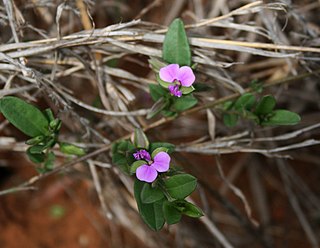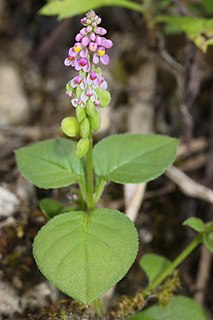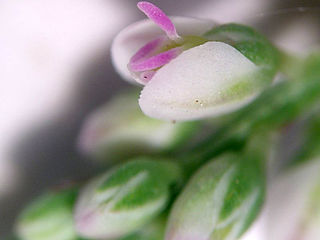Recchia is a genus of trees in the family Surianaceae. It is native to tropical habitats of Mexico.
The Plant List was a list of botanical names of species of plants created by the Royal Botanic Gardens, Kew and the Missouri Botanical Garden and launched in 2010. It was intended to be a comprehensive record of all known names of plant species over time, and was produced in response to Target 1 of the 2002-2010 Global Strategy for Plant Conservation, to produce "An online flora of all known plants.” It has not been updated since 2013, and is superseded by World Flora Online.
Polygala sekhukhuniensis is a species of flowering plant in the milkwort family (Polygalaceae). It is endemic to South Africa.

Polygala serpentaria is a species of flowering plant in the milkwort family (Polygalaceae). It is native to South Africa and Botswana.

Polygala sibirica is a species of flowering plant in the milkwort family (Polygalaceae). It is native to Europe and Asia.
Polygala succulenta is a species of flowering plant in the milkwort family (Polygalaceae). It is endemic to Australia.

Polygala tatarinowii is a species of flowering plant in the milkwort family (Polygalaceae). It is native to China, Japan, Korea, Russia, Myanmar, the Philippines, Taiwan, and Vietnam.
Polygala tepperi is a species of flowering plant in the milkwort family (Polygalaceae). It is endemic to Australia.
Polygala triflora is a species of flowering plant in the milkwort family (Polygalaceae). It is native to Borneo, Cambodia, Hainan, Laos, Maluku, Myanmar, New Guinea, New South Wales, Northern Territory, Philippines, Queensland, South Australia, Sri Lanka, Sulawesi, Sumatera, Thailand.
Polygala umbellata is a species of flowering plant in the milkwort family (Polygalaceae). It is endemic to South Africa.

Polygala vayredae is a species of flowering plant in the milkwort family (Polygalaceae). It is endemic to the Pyrenees in Spain.
Polygala venenosa is a species of flowering plant in the milkwort family (Polygalaceae). It is native to Thailand, Malaysia, Philippines, and Indonesia.

Polygala verticillata is a species of flowering plant in the milkwort family (Polygalaceae). It is native to the United States and Mexico.
Polygala virgata is a species of flowering plant in the milkwort family (Polygalaceae). It is native to South Africa and Botswana.
Polygala watsonii is a species of flowering plant in the milkwort family (Polygalaceae). It is endemic to Mexico.
Recchia connaroides is a species of trees in the family Surianaceae. It is native to tropical habitats of Mexico.
Alexandra Recchia is a French karateka. She is a two-time gold medalist in the women's kumite 50 kg event at the World Karate Championships and a two-time gold medalist in this event at the European Karate Championships.
The Tall Sugarbush is a flowering shrub belonging to the genus Protea. It is native to the montane grasslands of central Africa. Its worldwide distribution extends roughly from southern Nigeria and Ethiopia in the north to Zimbabwe, Mozambique and Malawi in the south.




